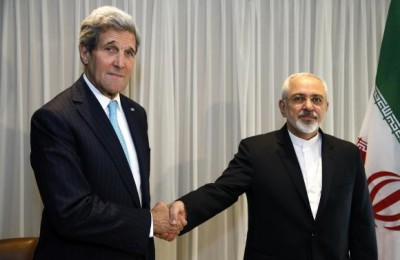
CREDIT: REUTERS/RICK WILKING
Negotiators from Iran and six major powers agreed to resume talks next Monday at a venue to be decided, the official said, speaking after U.S. Secretary of State John Kerry and Foreign Minister Mohammad Javad Zarif held two-day talks in Geneva.
Zarif told Iran’s Fars news agency: “We had serious talks with the P5+1 representatives and especially with the Americans in the past three days … But still there is a long way to reach a final agreement.”
The P5+1 group — the United States, Russia, China, Britain, France and Germany — are seeking to negotiate an agreement with Tehran to address concerns that Iran is seeking nuclear weapons technology, something it denies.
“These were very serious, useful and constructive discussions. We have made some progress but we still have a long way to go. We did very much sharpen up some of the tough issues so we can work to resolution,” the senior U.S. administration official told reporters.
Negotiators hope to meet a self-imposed March 31 deadline for an initial political deal, but the U.S. official said that would not “make us rush to an agreement that does not fulfil the objectives that the president has given to us.”
The aim of ensuring Iran does not acquire a nuclear weapon “has to be met and that is not about the deadline, it is about the purpose”, the official said. Iran, which denies having any nuclear weapons programme, hopes a deal will bring relief from international sanctions.
U.S. Energy Secretary Ernest Moniz, Iran’s atomic nuclear chief Ali Akbar Salehi, and Helga Schmid, political director of the European Union’s External Action Service also took part in the talks.
Few details of the negotiations have emerged, but the approaching deadline has caused divisions between the United States and one of its closest allies, Israel, which has called the talks “dangerous” and “astonishing”. The United States has accused it of distorting Washington’s position.
Reuters

Leave a Reply
You must be logged in to post a comment.